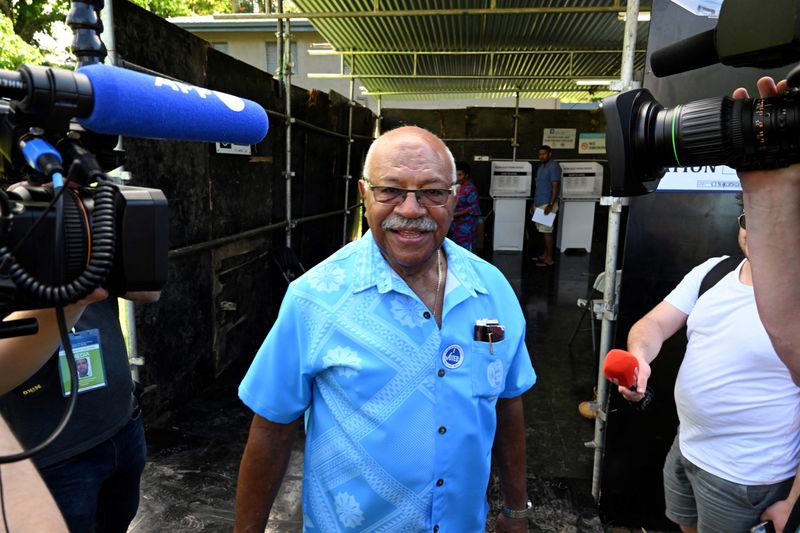By Kirsty Needham and Lucy Craymer
SYDNEY (Reuters) -Fiji's parliament has delayed its first sitting, where it had been expected a new prime minister would be sworn in to the Pacific islands nation for the first time in 16 years.
People's Alliance leader Sitiveni Rabuka was expected to become prime minister, after three parties signed a coalition agreement on Tuesday after a hung election.
The deal was designed to dislodge Fiji First's Frank Bainimarama, who has led Fiji since a 2006 coup, but on Wednesday afternoon Fiji First broke its silence on the election result and questioned whether the coalition agreement was solid.
The constitution requires lawmakers to elect the prime minister from the parliament floor if no one party has won more than 50% of seats.
Fiji parliament's secretariat confirmed to Reuters in an email that parliament would not sit on Wednesday because Fiji's President Wiliame Katonivere has not yet issued a proclamation.
The Social Democratic Liberal Party (SODELPA), a power-broker holding three seats in the hung parliament, on Tuesday signed a coalition agreement with Rabuka's People's Alliance and the National Federation Party.
SODELPA's decision was made after a close vote that saw 16 of its board members in favour, while 14 had supported Bainimarama's Fiji First.
SODELPA's general secretary Lenaitasi Duru resigned over the outcome, and wrote to Fiji's parliament and Katonivere requesting a delay in parliament's return claiming SODELPA's decision was "null and void", TV network FBC reported.
Fiji First's secretary general, Aiyaz Sayed-Khaiyum, who was the Attorney General in Bainimarama's government, held a press conference on Wednesday afternoon and said Bainimarama remained prime minister until the new parliament was convened and a new prime minister was elected by 50% of lawmakers.
The president could dissolve the parliament, which must sit before Jan. 2, and call a new election if the candidate for prime minister fails to win support from 50% of lawmakers after three attempts, he said.
"Rabuka can't be prime minister unless he gets elected on the floor of parliament," he said.
Rabuka responded by saying Bainimarama should accept the result of the election, Fiji Village reported.
The Pacific island nation, with a population of 900,000, had a history of military coups before constitutional reform in 2013 to remove a race-based voting system that favoured indigenous Fijians over a large Indian ethnic group.
Bainimarama won democratic elections in 2014 and 2018 with the support of the Indian community, but has faced criticism over his government's punitive media laws and pressure on the judiciary, and has not commented publicly since voting last week.

On Wednesday morning New Zealand Prime Minister Jacinda Ardern said New Zealand was yet to congratulate Rabuka as it waited until the "dust settles and there is finality over processes".
"I have faith in Fiji's ability to conduct the remaining stages of this process and stand ready to acknowledge their new leader," she said.